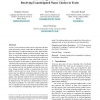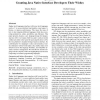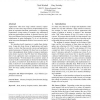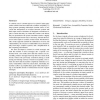114
Voted
OOPSLA
2007
Springer
15 years 8 months ago
2007
Springer
Current real-world software applications typically involve heavy use of relational and XML data and their query languages. Unfortunately object-oriented languages and database que...
66
Voted
OOPSLA
2007
Springer
15 years 8 months ago
2007
Springer
82
Voted
OOPSLA
2007
Springer
15 years 8 months ago
2007
Springer
101
Voted
OOPSLA
2007
Springer
15 years 8 months ago
2007
Springer
58
Voted
OOPSLA
2007
Springer
15 years 8 months ago
2007
Springer
128
click to vote
OOPSLA
2007
Springer
15 years 8 months ago
2007
Springer
Schematic tables are a new representation for conditionals. Roughly a cross between decision tables and data flow graphs, they represent computation and decision-making orthogona...
175
Voted
OOPSLA
2007
Springer
15 years 8 months ago
2007
Springer
Developing a general component system for a statically typed, object-oriented language is a challenging design problem for two reasons. First, mutually recursive references across...
137
click to vote
OOPSLA
2007
Springer
15 years 8 months ago
2007
Springer
Omniscient debuggers make it possible to navigate backwards in time within a program execution trace, drastically improving the task of debugging complex applications. Still, they...
107
click to vote
OOPSLA
2007
Springer
15 years 8 months ago
2007
Springer
A comfort zone is a tested region of a system’s input space within which it has been observed to behave acceptably. To keep systems operating within their comfort zones, we advo...
119
click to vote
OOPSLA
2007
Springer
15 years 8 months ago
2007
Springer
Objects often define usage protocols that clients must follow in order for these objects to work properly. Aliasing makes it notoriously difficult to check whether clients and i...




